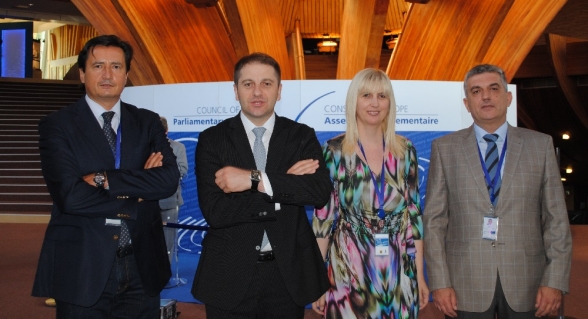By opening the debate on the political and humanitarian consequences of the crisis in Ukraine, Mr Jordi Xuclà from Spain said that Ukraine’s new President had taken some steps in the right direction, and one of his main tasks would be to rebuild trust among people in the East of the country. He said that one of the new President’s tasks would be to conduct a dialogue with stakeholders in the East in order to take forward reforms, including decentralisation, constitutional reform, balances, control of power and independent judiciary.
Ukrainian President, Mr Petro Poroshenko, said it was only through peaceful dialogue that conflicts in Ukraine could be resolved. He called for de-escalation of the conflict in the East of the country and restoration of peace in Ukraine. He said that his peace plan had received major support internationally, but that support from Moscow remained inadequate, considering that Russia should be urged to contribute to the settlement of the complex situation and to support the peace plan with concrete actions. Ending the regime of military control along Ukraine’s borders is now a key priority, with the possibility that international institutions be invited to send monitors.
Ukraine’s President thanked the Council of Europe for its prompt response to the crisis and expressed the will to continue cooperation. He said that Ukraine has started implementing a package of measures to fight corruption, and reform of the judiciary would be pursued to ensure greater transparency and public confidence in judicial institutions. In line with the European Charter of Local Self-Government, steps have been taken to decentralize administration. President Poroshenko hopes that the early local elections will contribute to achieving unity and stability in the country.
In the afternoon there were discussions on the challenges faced by the Development Bank of the Council of Europe as well as the European administration and the challenges that the state administration was facing.
The Assembly called on the Development Bank (CEB) to strengthen its ties with the Council of Europe, by inviting it to work closely not only with the Secretary General but also the President of PACE, the parliamentary rapporteur on the CEB and the Commissioner for Human Rights, and to invite them to annual meetings of the Governing Board and joint meetings of the collegial bodies. The parliamentarians underlined the importance of direct contacts between the Bank and the representatives of parliaments of member States of the Council of Europe for enhancing the visibility of the CEB’s work. It was stressed that there were many ways of cooperation between the CEB and the Council of Europe through projects relating to youth employment, Roma integration and housing for vulnerable population groups.
A high-quality civil service is a vital precondition for strong democracy, and any future administrative reform must take account of the interests of citizens and Europe’s common values, it was emphasized during the debate on the challenges faced by the public administration. The Assembly therefore asked the parliaments of the member States to evaluate the reform measures taken in the field of public administration and public services and consider whether they were in line with the concept of social cohesion.
Members of the Parliament, Mr Predrag Sekulić and Mr Mladen Bojanić participated at the meeting of the Committee for monitoring, where an oral Report on the visit of co-rapporteurs of the Committee for Monitoring to Montenegro was presented, realized in the period from the 14 to 16 April 2014
During the day, members of the Montenegrin delegation took part in meetings of the Committee on Political Affairs and Democracy, Committee on Social Affairs, Health and Sustainable Development, the Committee on Migration, Refugees and Displaced Persons, the Committee on Equality and Non-Discrimination and the Committee on Legal Affairs and Human Rights.
On the final day of the Summer Session on Plenum of the Parliamentary Assembly of the Council of Europe the discussion will be about strengthening of the independence of the European Court of Human Rights, as well as the extent to which the judiciary was customized to minors
Montenegrin delegation participating at the Summer Session is composed of: Mr Predrag Sekulić, Mr Damir Šehović, Mr Mladen Bojanić and Ms Snežana Jonica.








